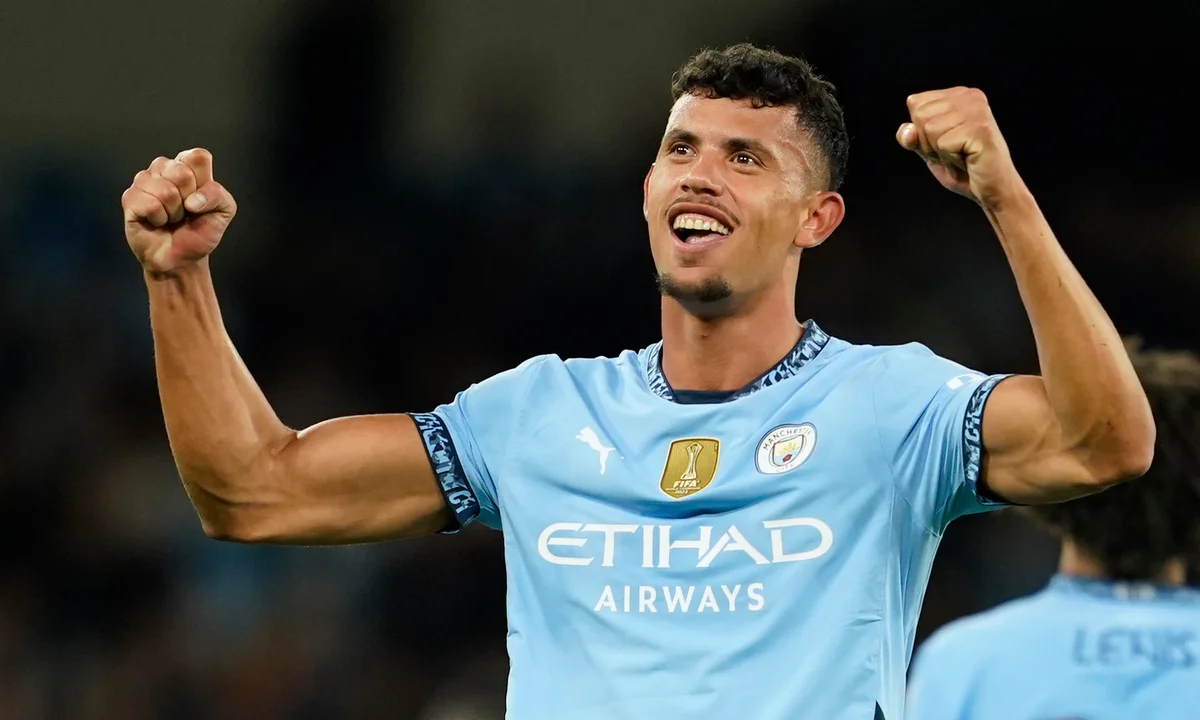Matheus Nunes to leave Man City because he lacks playing time

The modern football transfer market is littered with stories of promising talents who failed to live up to their hefty price tags. Matheus Nunes’ ongoing struggle at Manchester City represents one such cautionary tale, illustrating the complex dynamics between individual talent, tactical systems, and managerial expectations at the highest level of European football. What began as a promising acquisition has evolved into a study of misplaced investment and tactical misalignment, raising fundamental questions about recruitment strategy and player development in elite football.
Since his £53 million arrival from Wolverhampton Wanderers in August 2023, Nunes has found himself caught between high expectations and harsh realities. His journey at the Etihad Stadium encapsulates the challenges faced by players attempting to integrate into Pep Guardiola’s demanding tactical framework, where technical ability alone proves insufficient without the accompanying football intelligence and positional discipline that defines City’s playing philosophy.
The Portuguese Prodigy: Rise Through the Ranks
To understand Nunes’ current predicament, one must examine his trajectory to Manchester City. Born in Rio de Janeiro but representing Portugal internationally, Nunes’ football education began in the youth systems of Ericeirense before progressing through Estoril’s academy. His professional breakthrough came at Sporting CP, where he developed into one of the most promising midfielders in Portuguese football.
At Sporting, Nunes demonstrated the qualities that would eventually catch the attention of Premier League scouts. His ability to drive forward with the ball, coupled with his physical presence and technical skills, made him a standout performer in the Primeira Liga. Standing at 6’0″ with exceptional pace and dribbling ability, he possessed the modern midfielder’s toolkit – versatility, athleticism, and flair.
His performances in European competitions further enhanced his reputation. Against elite opposition, Nunes showed glimpses of the player he could become, combining defensive work rate with offensive creativity. These displays convinced Wolverhampton Wanderers to invest approximately £38 million in his services during the summer of 2022, making him one of the most expensive Portuguese exports of that transfer window.
The Molineux Chapter: Foundation Building
Nunes’ season at Wolverhampton Wanderers proved crucial in establishing his Premier League credentials. Under Bruno Lage initially and later Julen Lopetegui, he adapted to the physical demands and tactical nuances of English football. His versatility became his calling card – equally comfortable in central midfield, as a box-to-box player, or drifting wide to create overloads.
Statistically, his Wolves season wasn’t spectacular in terms of goals and assists, but his underlying metrics told a different story. His progressive passes, ball carries, and defensive actions per game ranked highly among Premier League midfielders. More importantly, he demonstrated mental resilience and adaptability, qualities that suggested he could thrive at a higher level.
The eye test supported the statistics. Nunes possessed that rare ability to beat players in tight spaces, his close control and quick feet allowing him to navigate congested midfield areas. His physical attributes – pace, strength, and stamina – made him a complete midfielder package. These qualities inevitably attracted attention from Manchester City, who were looking to refresh their midfield options and add younger legs to complement their aging core.
The Guardiola Gamble: Expectations and Early Promise
When Manchester City triggered Nunes’ release clause in August 2023, the move was seen as a statement of intent. The £53 million fee represented a significant investment in potential rather than proven Premier League quality, but Guardiola’s track record of developing midfielders provided optimism about the Portuguese’s prospects.
Guardiola’s initial comments about Nunes were characteristically encouraging yet measured. The Catalan coach praised his new signing’s versatility and physical attributes while acknowledging areas for improvement. “He can play in different positions,” Guardiola noted during Nunes’ unveiling. “His physicality is exceptional, and with time, we believe he can even adapt to playing as a full-back if needed.”
These early assessments proved prophetic, though perhaps not in the way Guardiola initially envisioned. The manager’s mention of positional flexibility would later become central to Nunes’ City career, albeit in circumstances neither party likely anticipated during those optimistic early days.
Nunes’ first goal for Manchester City came in September 2024 during a Carabao Cup match against Watford. The strike showcased his pace and finishing ability, earning praise from Guardiola who highlighted his “remarkable speed” and described him as “deserving” of the moment. This goal represented a high-water mark in his City career, a moment when everything seemed possible for the Portuguese midfielder.
The Tactical Puzzle: Square Pegs and Round Holes
However, integrating into Manchester City’s midfield proved more challenging than anticipated. Guardiola’s tactical system demands specific qualities from midfielders that extend far beyond traditional technical abilities. The concept of “football intelligence” – the ability to read the game several moves ahead, understand spatial relationships, and make split-second decisions under pressure – becomes paramount in City’s possession-based approach.
City’s midfield operates on principles of positional play where each player must understand not only their role but also how their positioning affects every other player on the pitch. The likes of Kevin De Bruyne, Rodri, and Bernardo Silva have mastered this art, seamlessly rotating positions while maintaining the team’s structural integrity. For newcomers, this represents a steep learning curve that demands both intellectual understanding and intuitive feel for the game.
Nunes’ struggles in this area became increasingly apparent as the season progressed. While his individual skills remained evident, his decision-making in City’s complex tactical framework often appeared hesitant or inappropriate. The quick, instinctive passes that characterize City’s best midfield play seemed beyond his current capabilities, leading to increasingly limited opportunities in his preferred central role.
Guardiola’s assessment of Nunes as “not clever enough” for City’s midfield, while harsh in its delivery, reflected these tactical realities. The comment wasn’t necessarily a criticism of Nunes’ overall intelligence but rather a specific judgment about his current ability to operate within City’s demanding positional system. In Guardiola’s lexicon, “cleverness” refers to tactical awareness, pattern recognition, and decision-making speed – qualities that can be developed but require time and consistent exposure to high-level competition.
The Right-Back Experiment: Desperation or Innovation?
Kyle Walker’s January 2025 departure to AC Milan on loan created an unexpected opportunity for Nunes. With limited options at right-back, Guardiola made the bold decision to deploy the Portuguese midfielder in an unfamiliar defensive role. This move represented both tactical pragmatism and strategic risk, as Guardiola sought to maximize squad utilization while addressing positional shortages.
The decision wasn’t entirely without precedent in Guardiola’s managerial history. His successful conversions of Fabian Delph and Oleksandr Zinchenko from midfielders to full-backs during his early Manchester City years demonstrated his ability to reimagine player roles. However, those transformations occurred with players who possessed specific attributes suited to defensive responsibilities – qualities that Nunes arguably lacked.
Playing as a right-back in Guardiola’s system requires a unique skill set. The position demands defensive solidity, positional discipline, and the ability to provide width in attack while maintaining tactical balance. Modern full-backs must be comfortable defending one-on-one situations, deliver accurate crosses, and possess the football intelligence to know when to push forward and when to stay back.
Nunes’ performances in this role have been inconsistent at best. His pace and dribbling ability provide attacking threat down the right flank, but his defensive positioning and crossing accuracy have drawn criticism from fans and pundits alike. The statistics from his right-back performances tell a mixed story – decent pass completion rates offset by poor defensive duel success and limited attacking output.
Statistical Analysis: Numbers Don’t Lie
A detailed examination of Nunes’ 2024/25 season statistics reveals the extent of his struggles to establish himself at Manchester City. Across 21 appearances in all competitions, his output has been modest:
Attacking Statistics:
- Goals: 0
- Assists: 4
- Expected Goals (xG): 0.8
- Expected Assists (xA): 2.1
- Key Passes per 90: 1.2
- Successful Dribbles per 90: 1.8
Passing and Possession:
- Pass Success Rate: 88%
- Progressive Passes per 90: 4.2
- Touches per 90: 52.1
- Pass Success Rate in Final Third: 82%
Defensive Metrics:
- Tackles per 90: 1.9
- Interceptions per 90: 1.1
- Duel Success Rate: 46%
- Aerial Duel Success Rate: 51%
These numbers paint a picture of a player struggling to impact games significantly. While his pass completion rate suggests composure on the ball, the low number of touches per 90 minutes indicates limited involvement in City’s build-up play. His defensive statistics are particularly concerning, with a duel success rate below 50% highlighting struggles in physical confrontations.
Comparing these figures to successful City midfielders reveals the gap in performance. Rodri, for example, typically records 70-80 touches per game with significantly higher defensive action counts. Even when accounting for different roles and playing time, Nunes’ statistical profile suggests a player yet to find his optimal position within the team structure.
Fan Sentiment and Media Criticism
The response from Manchester City supporters has been mixed but increasingly critical. Social media platforms and fan forums reflect growing frustration with Nunes’ performances, particularly when deployed at right-back. Many fans acknowledge the challenging circumstances – being played out of position with limited opportunities to build rhythm – but question whether he possesses the qualities necessary to succeed at the Etihad.
Comments from prominent pundits have been similarly critical. Danny Murphy’s assessment on talkSPORT was particularly damning: “He’s not a great crosser, not a brilliant passer, and he looks lost in City’s tactical setup. He needs to be a big fish in a smaller pond.” This sentiment has been echoed by other former professionals and tactical analysts who question Nunes’ suitability for Guardiola’s system.
The media narrative around Nunes has shifted from cautious optimism to growing skepticism. Initial reports focused on his potential and adaptation period, but recent coverage has concentrated on tactical misfit concerns and transfer speculation. This media pressure adds another layer of difficulty to his situation, as every performance is scrutinized for signs of improvement or further decline.
The Broader Context: City’s Season of Transition
Nunes’ struggles cannot be viewed in isolation from Manchester City’s broader challenges during the 2024/25 season. The team has experienced uncharacteristic inconsistency, with defensive vulnerabilities and midfield creativity issues contributing to a disappointing campaign by their elevated standards. In this context, Nunes’ inability to provide solutions has become more glaring.
The departure of key players like Kyle Walker has exposed squad depth issues that many assumed didn’t exist at Manchester City. Nunes was expected to be part of the solution to these problems, providing versatility and energy to refresh an aging squad. His failure to fulfill this role has contributed to wider questions about City’s recruitment strategy and succession planning.
Guardiola’s tactical approach has also come under scrutiny, with critics arguing that his system has become predictable and that his demands on players have become increasingly rigid. Nunes’ struggles could be seen as symptomatic of these broader issues, representing a player caught between system demands and individual limitations.
Transfer Market Realities: The Financial Dimension
The economic aspect of Nunes’ situation adds complexity to any potential resolution. Manchester City’s £53 million investment represents a significant financial commitment that cannot be easily written off. With three years remaining on his contract, the club faces a potential loss if they choose to sell, as few clubs would be willing to match or approach their initial outlay.
Current market conditions further complicate matters. The post-pandemic football economy has made large transfers increasingly rare, with clubs more cautious about significant investments. Nunes’ diminished stock following his City struggles would likely necessitate a substantial loss for any sale to materialize.
Several potential destinations have been suggested for Nunes, each presenting different advantages and challenges:
Premier League Options: Clubs like Aston Villa, Brighton, or West Ham could provide the tactical freedom and regular playing time Nunes needs to rediscover his form. However, these clubs would likely be unable to match City’s financial expectations, necessitating loan deals or heavily reduced fees.
European Alternatives: Serie A or La Liga clubs might offer tactical systems better suited to Nunes’ skills. Italian football’s emphasis on technical ability and tactical intelligence could provide a better environment for his development. Spanish clubs’ possession-based approaches might also suit his playing style.
Return to Portugal: A return to familiar surroundings in Portuguese football could reignite his career, though financial constraints would make such moves challenging. The emotional appeal of returning home might influence his decision-making if other options prove limited.
Psychological Factors: Mental Challenges at Elite Level
The psychological dimension of Nunes’ struggles deserves consideration. Playing for Manchester City under Pep Guardiola creates immense pressure that can affect even experienced professionals. For a player already struggling to adapt tactically, the mental burden of constant scrutiny and criticism can become overwhelming.
The transition from being a key player at Wolverhampton to a peripheral figure at Manchester City represents a significant psychological adjustment. The confidence that comes from regular playing time and tactical familiarity has been replaced by uncertainty and self-doubt. This mental aspect often proves as challenging as the tactical demands, creating a cycle where poor performances lead to reduced confidence, which in turn affects subsequent performances.
Guardiola’s public criticism, while honest, adds another layer of psychological pressure. Being publicly questioned about football intelligence by one of the game’s most respected coaches can be devastating for a player’s confidence. Recovery from such setbacks requires mental resilience and strong support systems, resources that may not be readily available in City’s high-pressure environment.
Lessons for Modern Football: Recruitment and Development
Nunes’ case study offers valuable insights into modern football recruitment and player development. The assumption that technical ability and physical attributes automatically translate to success at elite levels has been thoroughly challenged. His situation demonstrates the importance of tactical fit and football intelligence in determining player success.
The role of patience in player development also emerges as a crucial factor. While some players adapt quickly to new systems, others require extended periods to reach their potential. The pressure for immediate returns on investment in modern football often conflicts with the time needed for proper development.
City’s recruitment strategy, widely praised for its success, faces questions about the Nunes acquisition. The decision to invest heavily in potential rather than proven quality at the highest level represents a departure from their typical approach. Whether this represents a one-off miscalculation or a broader shift in strategy remains to be seen.
Future Scenarios: Possible Outcomes
Several scenarios could unfold regarding Nunes’ future at Manchester City:
Redemption Arc: A change in tactics, injury crisis, or sudden improvement in form could resurrect his City career. Football’s unpredictable nature means dramatic turnarounds remain possible, though increasingly unlikely given current evidence.
Loan Solution: A temporary move to gain regular playing time and confidence could benefit all parties. This approach would preserve City’s investment while allowing Nunes to develop away from intense scrutiny.
Permanent Exit: A permanent transfer appears increasingly likely, though financial considerations will heavily influence any deal structure. The club may need to accept significant losses to facilitate his departure.
Positional Reinvention: Continued development as a right-back or exploration of other positions could provide a pathway to regular football. Success in this approach would require significant improvement in current performance levels.
Conclusion: A Tale of Modern Football’s Complexities
The Matheus Nunes saga at Manchester City represents more than just a transfer that didn’t work out. It encapsulates the complexities of modern elite football, where individual talent must align with tactical systems, where financial investments create pressure for immediate returns, and where the gap between potential and realization can prove unbridgeable.
His story serves as a reminder that football success at the highest level requires a perfect storm of factors – ability, opportunity, system fit, mental strength, and timing. When these elements don’t align, even the most promising talents can struggle to fulfill their potential.
For Manchester City, the Nunes situation represents a rare recruitment miscalculation that highlights the challenges of squad building in an increasingly complex tactical landscape. For Nunes himself, it’s a career crossroads that will define his trajectory in elite football.
Whether this chapter ends in redemption or represents a cautionary tale will be determined in the coming months. What’s certain is that the Matheus Nunes experiment at Manchester City has provided valuable lessons about the unpredictable nature of football transfers and the unforgiving demands of success at the very top of the game.
The beautiful game’s capacity for surprise means Nunes’ story isn’t over yet, but current evidence suggests that his future lies away from the Etihad Stadium. For a player once touted as one of Portugal’s brightest prospects, finding the right environment to showcase his undoubted talents will be crucial for salvaging a career that promised so much but has, thus far, delivered so little at the highest level.















